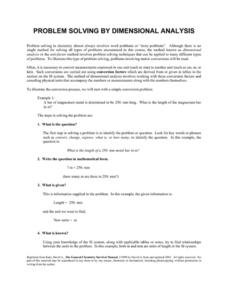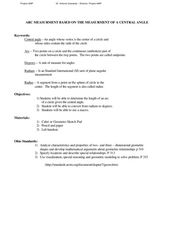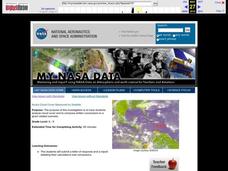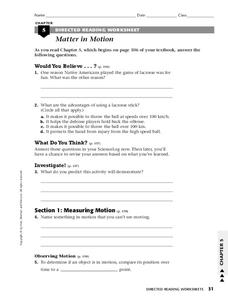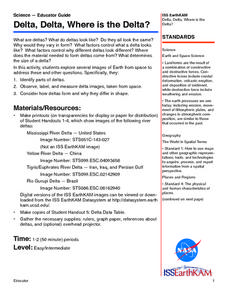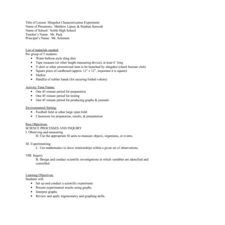Chymist
Problem Solving by Dimensional Analysis
Is your class in another dimension with regards to dimensional analysis? Give them some extra practice with a straightforward activity. Learners convert units by following concise step-wise examples, including setting up the problems....
Curated OER
Tools of the Trade
Third graders explore and identify the tools that can be used to measure length, mass/weight, and volume. They discuss how things are measured using different units, and observe the difference between the English and the Metric systems....
Curated OER
"Measurement in Motion"
Ninth graders examine the rate of motion and changes in motion using a ramp and a rolling object. They conduct the demonstration, determine the average speed, and describe how a moving object can have zero acceleration and deceleration.
Curated OER
Deliver
Students measure the mass, volume, length and area of various objects. They are assigned a letter. The task is assesses students' abilities to make simple observations and measurements.
Curated OER
Arc Measurement Based on The Measurement of a Central Angle
Students define keywords that are important to solve problems. In this geometry lesson, students find the arc length and angle of a circle. They convert between radians and degrees.
Alabama Learning Exchange (ALEX)
Sonar Mapping of the Ocean Floor
Eighth graders participate in an experiment that emulates a sonar signal bouncing off the ocean floor. They determine how the ocean floor is measured by the length of time it takes for the sonar signal to return. They work with a wooden...
Curated OER
Aruba Cloud Cover Measured by Satellite
Students analyze cloud cover and to compose written conclusions to a given related scenario. They submit a letter of response and a report detailing their calculations and conclusions.
Curated OER
Presidents of the United States
Young scholars discuss American Presidents. They each complete research on one particular President and then, using a template, create a short biography (including a picture) about him. When all biographies are complete, they compile...
Science Geek
Basic Thermochemistry
Heat is more than just temperature, as viewers discover throughout a presentation about thermochemistry that emphasizes vocabulary. Definitions include joule, calorie, energy, enthalpy, calorimetry, exothermic and endothermic process,...
Curated OER
Matter in Motion
For this matter in motion worksheet, students answer the provided questions as it relates to motion, speed, velocity, and acceleration. Students mark given statements as either true or false.
Curated OER
Calculations
In this calculations worksheet, students express numbers in scientific notation and determine the number of significant figures. Students find conversion factors to change units. This worksheet has 8 word problems.
Curated OER
Delta, Delta, Where is the Delta?
Students explore several images of Earth from space. They identify parts of deltas. They observe, label, and measure delta images, taken from space. They consider how deltas form and why they differ in shape.
Curated OER
International Festival: Japan
Students discover Japanese culture and the importance of Sakura to Japan. In this international festival instructional activity, students demonstrate an appreciation for the Sakura trees beauty by creating Sakura trees from white and...
Curated OER
How far is a km?
Young scholars explore the size of a kilometer and the time it takes to cover this distance. They develop a concept of a km. They measure a distance of 1 km and the time taken to cover it.
Curated OER
Exploring History Through Photographs
Fifth graders compare and contrast photographs from the 1800s to those of 2003. In groups, they create drawings of how society has changed over time and use maps to locate local streets. Individually, they practice measuring the...
Virginia Department of Education
Charles’ Law
Searching for a relatively interesting way to demonstrate Charles' Law? Here is a instructional activity in which pupils heat air inside a flask and then cool the flask to quickly cool the air. They make observations about what occurs...
Curated OER
Metric Conversions Worksheet
In this metric activity, students examine conversion factors for length, mass, volume and area. Definitions of prefixes and metric abbreviations are identified.
Curated OER
Wig-wag Physics
High schoolers make observations on the effects of a small, medium and large weight on the movement of a wig-wag apparatus. They use their observations to develop a generalized inference of the effect weight on movement patterns.
Virginia Department of Education
Moles Lab Activities
Want my name and number? It's 6.0221415 times 10 to the 23rd, and my name is Avogadro. Providing nine different activities, experiments, and labs, this lesson keeps Avogadro relevant to your class all year long.
Curated OER
Slingshot Characterization Experiment
Students set up and conduct a scientific experiment to demonstrate data collection. In this scientific process instructional activity, students complete an activity with the specific objective of using a slingshot to fire a t-shirt into...
Science Geek
Bulk Properties of Water
Learn the ins and outs of the properties of water through an engaging slide show. The lesson presents different facts about water including phase change, heat of fusion, heat of vaporization, and specific heat among others.
Science Geek
Thermochemical Calculations
Viewers learn where the heat goes when phase changes take place with a presentation that explains the latent heat of phase changes, or, more specifically, the molar heat of fusion, solidification, vaporization, and condensation. The show...
Curated OER
Poetry and Our National Anthem
Students express the meaning of the Star-Spangled Banner. In this American history lesson, students read through the national anthem and complete an activities from a list of choices. Some choices include: writing the anthem in your own...
Virginia Department of Education
Solution Concentrations
What happens when you combine 6.022 times 10 to the 23 piles of dirt into one? You make a mountain out of a mole hill. Scholars use dehydration to obtain percent composition and then calculate the molarity of the original solution.


